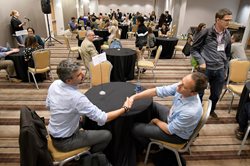What do you do when you have a PhD in applied physics from Rice University, solid experience in bioengineering, and a growing passion for doing something on the front lines of global health?
You go speed networking.

That’s what Jennifer Burnett was doing Tuesday evening at the 2016 ASTMH Annual Meeting.
Speed Networking with the Experts,” the Society's fourth year of a special session that brings together young scientists, most of them newly minted PhDs, with experts from many areas of tropical medicine.
Over the course of an hour, the young scientists moved from table to table where they held intense, five-minute conversations and talked intellectual passions and career paths with seasoned veterans from a wide variety of fields.
“We started out doing this with just the ASTMH Committee on Global Health, but it’s become very popular and now it involves the entire society,” said Koya Allen, with the Counter Biothreats Cell at U.S. European Command HQ at the Department of Defense European Command Headquarters in Stuttgart.
Allen is one of the speed networking co-chairs. She helps organize the event along with representatives from the ASTMH committees on Clinical Tropical Medicine and Traveler’s Health; Medical Entomology; Arthopod-Borne Viruses; and Molecular, Cellular and Immunoparasitology. She said this year’s session was filed to capacity with about 80 young scientists and 40 experts participating.
Burnett said she signed up because she wanted to gain a broader perspective on career options. She said in Houston, where Rice is located, most of the job leads were either defense-related or, given Houston’s ties to NASA, focused on the biomedical aspects of space exploration.
“In terms of global health, it’s hard to find a company that might be interested in something like diagnostics for infectious disease,” she said.
Her expert of the moment was
Davidson Hamer, MD, a Professor of Global Health and Medicine at Boston University who has projects in Zambia and Uganda, where he has worked on neonatal survival, HIV/AIDS and malaria prevention. He told Burnett that “there is a tremendous need” for engineering expertise in global health. For example, he noted the demand for simple, easy to use field devices that can test for drug quality or perform diagnostics.
Meanwhile, at another table, Leora Feldstein, who recently earned a PhD at the University of Washington, was talking to Christopher Mores, PhD, an arbovirologist with the US Navy Medical Research Unit in Lima, Peru. Feldstein already has a job lined up with the Epidemic Intelligence Service at the US Centers for Disease Control and Prevention (CDC). She said the job “might be exactly what I’m looking for,” as a long-term career. But she participated in the networking event “because I want to know what else might be out there” for the future.
Mores advised her to “keep coming to meetings like this and make as many friends as you can and see what inspires you.”
“That way, there will always be plenty of room to reinvent yourself,” he said.